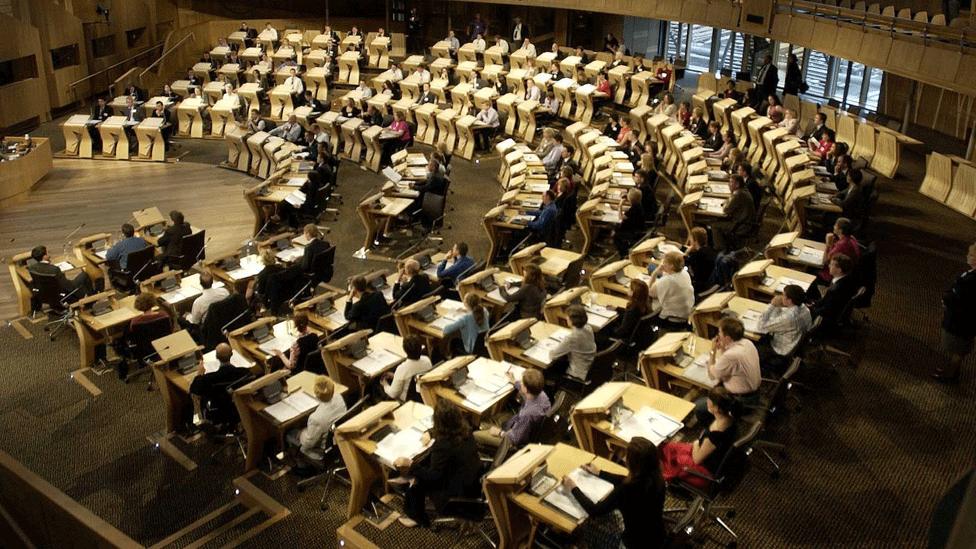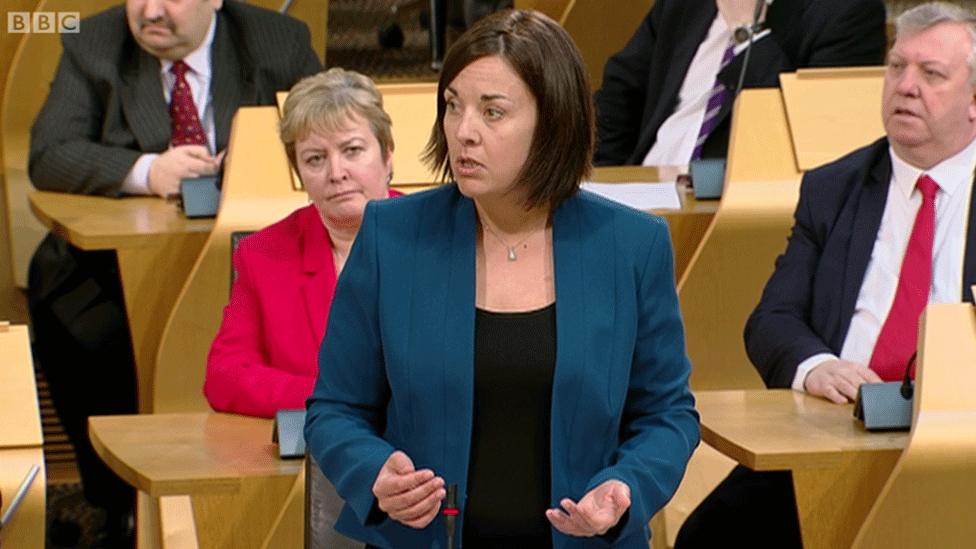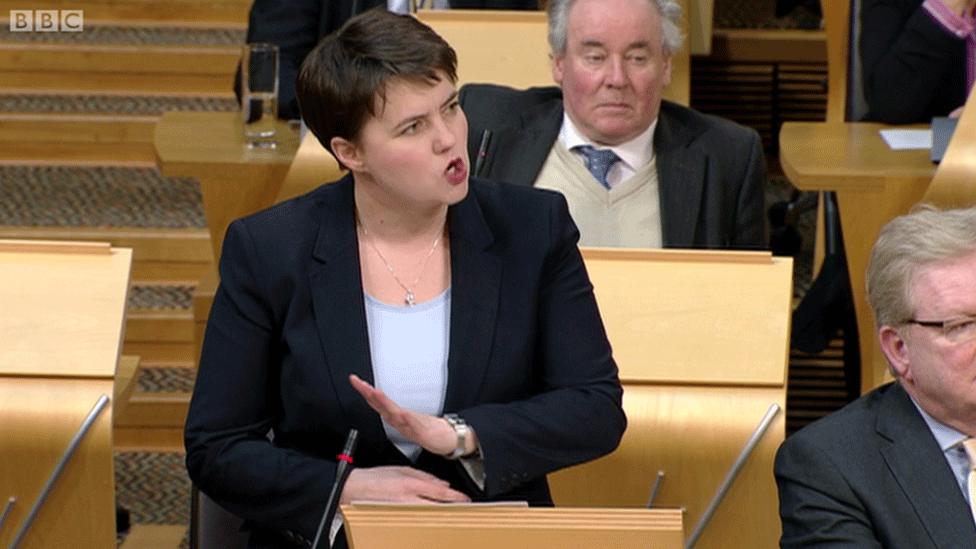Holyrood countdown: Who wants to be elected?
- Published
We're gonna rock to the rules that I make, I wanna be elected, elected, elected. I never lied to you, I've always been cool, I wanna be elected."
He is not my favourite singer. Not even close. But I have always found the partial banishment of ennui in the work of Alice Cooper.
For one thing, he has the same name as my late aunt. (OK, she was properly Alice-Mary. And she spelled her surname a different way. But who's quibbling?)
For another, he does not seem to take himself enormously seriously. A stage show that features blood and snakes is either.....
a) an homage to Beelzebub
or b) a form of mock shock theatricalism; rabid Panto.
For myself, I adhere to the latter interpretation. Either way, there is something curiously distracting about Alice Cooper. (The singer, that is, not my late aunt. She was an unalloyed joy; funny and warm.)
I chanced to be listening to one of AC's oeuvres, entitled "I want to be elected." His putative politician is, perhaps, a mite more self-centred than one would wish. However, said individual stresses an impact upon truth, upon being cool and upon establishing a third force in politics.
In AC's ditty, we never learn the outcome of the electoral contest in question. The song ends before the polls close. Was there a recount? Was there a legal challenge? Mr Cooper yells that he doesn't care - but I think we should know.
Right now, our elected tribunes and their would-be replacements are in a similar condition of uncertainty. Will they be returned? Will they be dumped by the voters? Will they be in government? Or political oblivion? (You ask where that it is? Somewhere near Brechin would be my guess.)
For today there are one hundred days to go until the Holyrood elections. (Yes, there are, whatever some Johnnie-Jump-the-Gun politicians may say. The Electoral Commission says it's today and, since they will be calculating campaign spending, we may presume that they can count.)
The common presumption appears to be that the SNP will be returned to power with another sizeable majority, possibly registering an increase.
What has gone before?
Before we contemplate that, let us recall how remarkable such a development was in the first place.
As I have been reminding audiences on the wireless, the electoral system for the Scottish Parliament was specifically designed, by Labour, to prevent the SNP from gaining majority power with a minority of the popular vote. Labour was prepared to sacrifice its own prospects of majority to thwart the Nats.
The SNP - and, more to the point, the voters - declined to play by the specified rules. Firstly, Alex Salmond entered minority power, external. Then came his strategy of seeking to govern consensually within devolved constraints while simultaneously advocating independence.
Seemed to work. Voters reckoned his governance was competent - and were not sufficiently impressed by the alternatives. Mr Salmond returned as FM with a majority.

The Scottish Parliament's next election will take place on 5 May this year
If anything, the referendum and its aftermath sharpened Scotland's focus upon Scottish affairs. The choice, increasingly, was which party would speak up most effectively for Scotland. The SNP corralled most of those votes.
Which brings us to today. Nicola Sturgeon is convening a meeting of her Cabinet to discuss prospects for the oil and gas industry. It is possible that there may be an initiative soon from the UK Government in a related area.
Why so? Because the sector needs assistance. And, politically, because UK ministers believe that by spotlighting the relative malaise in the North Sea they may remind voters of what they claim is a weak point in the independence case - and thus in the SNP.
Who is saying what?
Simultaneously, they underscore their role in assisting Scotland. SNP Ministers believe the sector can return to longer term strength - and want to emphasise their determination to support such an outcome.
What of the SNP's rivals? Kezia Dugdale remains relentlessly positive - although she could probably use a period of silence with regard to Labour's internal reflections upon the UK General Election defeat.
Conclusions to the effect that Scottish voters saw Labour as comparable to the Tories, just less competent, might eventually strain the semi-permanent smile on Ms Dugdale's visage.
There is, I think, a wider problem here within Labour. Kezia Dugdale understandably views the Holyrood elections as a big deal in themselves. She wants to be FM, if she can. She wants, at the very least, to counter the SNP and hold off insurgent Tories.
Westminster Labour strategists, perhaps understandably, have a rather different perspective. They view Holyrood and other contests as interim tests, as staging posts en route to the next UK General Election.

Kezia Dugdale's Labour is behind the SNP in the polls

Scottish Conservative leader Ruth Davidson will be eyeing up second place
They are thinking longer term than May and, consequently, are more inclined to view Scottish politics through a Westminster prism and a Westminster timetable.
When they talk of problems for the party in Scotland, the intrinsic question they are posing to themselves and the party is: can this be turned round in time for the next UK battle with the Tories? It is a matter of perspective.
That is one principal reason why Ms Dugdale is adamant that she will run the May election campaign in Scotland. On her terms and her Scottish party's policies. She believes she can challenge the SNP record and offer alternatives.
The other parties will, of course, be fighting for every vote....
Can the Tories take second place?
Can the Lib Dems fight back?
For the Greens, will it be 1999 or 2003 or variations thereone?
Can Ukip…?
Can RISE….?
One factor, as discussed yesterday, is tax. We are fairly accustomed to the parties' positions on education, the NHS and the rest. There will, of course, be amendments to note.
However, they have one hundred days to answer some very big questions. What to do about council tax? What to do about business rates? What, above all, to do with the new tax powers coming Scotland's way?
Big questions. Big choices. Serious stuff. As Mr Cooper might note, no more Ms Nice Guy.